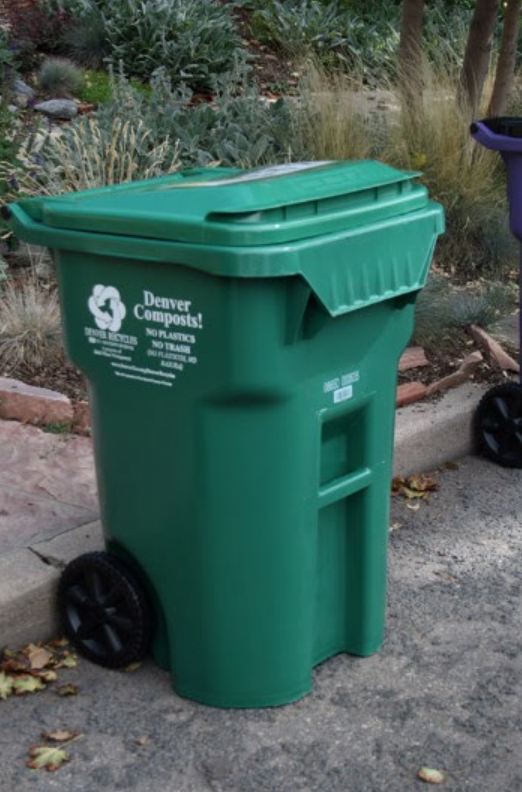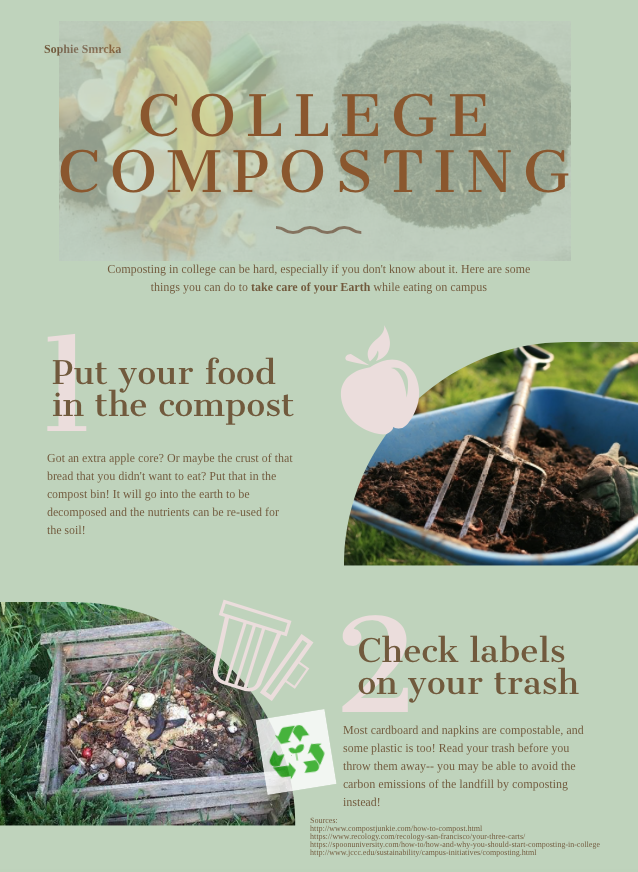By Sophie Smrcka

As you exit a dining hall, an academic building, a dorm, or the library on the University of Denver campus, you will see a compost bin. They are most often right next to the trash and recycling, clearly marked, and have a sign describing what should be disposed of in which receptacle. However, most of the time your napkin and food can be composted but your box for the food cannot be, the cup can be composted but the straw cannot. How many young college students are dedicated to actually separating their compost?
According to the University of Denver, waste diversion in the library is at 61%, meaning that 61% of waste is going somewhere besides a landfill. However, students say that they are not always inclined to use the compost bins, and that they often just find a trash can.
“Normally when I’m in a rush I just throw my trash in the nearest bin, which I know isn’t good for the environment but it’s so hard to know what goes where,” says sophomore Ashley Haws.
Haws thinks that there should be better communication regarding compost on campus, stating that she’s never really sure what trash goes where, and that she doesn’t fully understand why she should be composting anyway. On the DU campus, there are a total of 3 signs describing compostable items, but none explaining why composting is important and what impact it has.
The University of Denver utilizes Alpine Organics company for their recycling and composting needs. The Alpine website has a list of compostable items, but they have no information on why composting is important to the environment.
According to One Green Planet, composting is important because it reduces emissions, helps new plants grow, and reduces our reliance on fossil fuels. When senior Jack Trembath heard these things, he said it changed his mind on his conviction to compost on campus.
“I’ve always tried my best to compost, but from that it seems like it makes way more of a difference than I thought. I think if I had known that I would’ve made a bigger effort,” said Trembath.
According to a study being done by Jacqueline Rogeria Bringhenti et al, it is not only possible, but also extraordinarily helpful to have composting in Universities, because it encourages those habits in students as they leave their Universities and go on with their lives. However, the composting must be implemented in a way that is easy to use and understand, so that students know how to do it on their own.
“If I had known how to compost my freshman year of college, I’m sure I would’ve done it so much more. I probably would have grown like four trees out of that compost if I had been informed enough to do it,” says Trembath.
Although the library waste diversion is currently at 61%, the more informed students become, the better this number can become. The lack of communication surrounding composting on campus is reflected in how difficult it is to get any additional information on the University of Denver’s composting from the staff.
After contacting and being bounced between two people, having two cancelled interviews, and being referred to two more people on who to talk to about the efficiency and data of composting on campus, I was left with no quotes from the University, and was unable to even discover when the composting program was started.
On the flip side, when Arizona State University began composting in 2013, they were so informed and made such an impact that they managed to get an article published about them in a state composting magazine. In the Composting Roundup, it was written that ASU was instilling bins in all dining halls across all four campuses to collect compost, and that they aimed to expand outside of dining halls in the following January.
Composting has been instilled in college campuses across the country, and having it on the DU campus at all is a big step for the better. 61% is a big upgrade for waste diversion from a small 0%.
“I definitely appreciate that compost bins are there at all, because when I do have a little bit of burrito left or I didn’t finish my muffin, I know those go in the compost bin, and I can feel good knowing I didn’t put that in the trash,” says Haws.
Although these students feel that there could be a bigger impact if the University put more effort into informing the campus on composting needs, why it’s important to compost, and what can be composted, they agree that they’d rather have a compost bin and not know how to handle it than to not have one at all.
“I’m sure I could do more if I knew more, but hey, I wouldn’t be worried about composting on campus if I didn’t see the bin and have to wonder what I should put into it, right? I mean I would have less questions if I didn’t have to look at it every day,” says Trembath.
